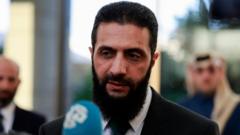In a significant broadcast interview with Saudi state broadcaster Al Arabiya, Ahmed al-Sharaa, the leader of the rebel group Hayat Tahrir al-Sham (HTS), revealed that new elections in Syria could take as long as four years to implement. This marks the first time he has shared a potential timeline since his group's offensive that led to the ousting of former President Bashar al-Assad. Al-Sharaa projected that the drafting of a new constitution might require up to three years, with substantial improvements to public services potentially materializing within a year after the previous regime’s downfall.
As the newly appointed head of the transitional authorities, al-Sharaa emphasized the necessity for an extensive rebuilding of Syria’s legal system. He noted the importance of conducting a comprehensive population census to facilitate legitimate elections. The HTS, originally known for its jihadist roots and ties to extremist organizations like al-Qaeda and Islamic State, has since sought to shed that image and present a more moderated governance approach.
In the interview, al-Sharaa discussed the upcoming national dialogue conference, where HTS is expected to announce its dissolution and engage with various stakeholders to unite the ethnically diverse nation after over a decade of civil war. He stressed that recent governmental appointments aimed to be inclusive rather than exclusive, addressing concerns over the representation of various ethnic and religious groups such as Kurds, Armenians, Druze, and many others.
Amidst the shifting political landscape, a UK-based war monitor reported nearly 300 arrests in connection with a crackdown on loyalists of the Assad government, suggesting collaboration with local populations in these endeavors. Weapons and ammunition were seized as tensions in the region continue to escalate.
In light of these developments, the future of governance in Syria remains uncertain, with al-Sharaa’s leadership facing scrutiny on whether it can fulfill its commitment to uphold the rights and freedoms of the diverse minorities within the country.
As the newly appointed head of the transitional authorities, al-Sharaa emphasized the necessity for an extensive rebuilding of Syria’s legal system. He noted the importance of conducting a comprehensive population census to facilitate legitimate elections. The HTS, originally known for its jihadist roots and ties to extremist organizations like al-Qaeda and Islamic State, has since sought to shed that image and present a more moderated governance approach.
In the interview, al-Sharaa discussed the upcoming national dialogue conference, where HTS is expected to announce its dissolution and engage with various stakeholders to unite the ethnically diverse nation after over a decade of civil war. He stressed that recent governmental appointments aimed to be inclusive rather than exclusive, addressing concerns over the representation of various ethnic and religious groups such as Kurds, Armenians, Druze, and many others.
Amidst the shifting political landscape, a UK-based war monitor reported nearly 300 arrests in connection with a crackdown on loyalists of the Assad government, suggesting collaboration with local populations in these endeavors. Weapons and ammunition were seized as tensions in the region continue to escalate.
In light of these developments, the future of governance in Syria remains uncertain, with al-Sharaa’s leadership facing scrutiny on whether it can fulfill its commitment to uphold the rights and freedoms of the diverse minorities within the country.





















